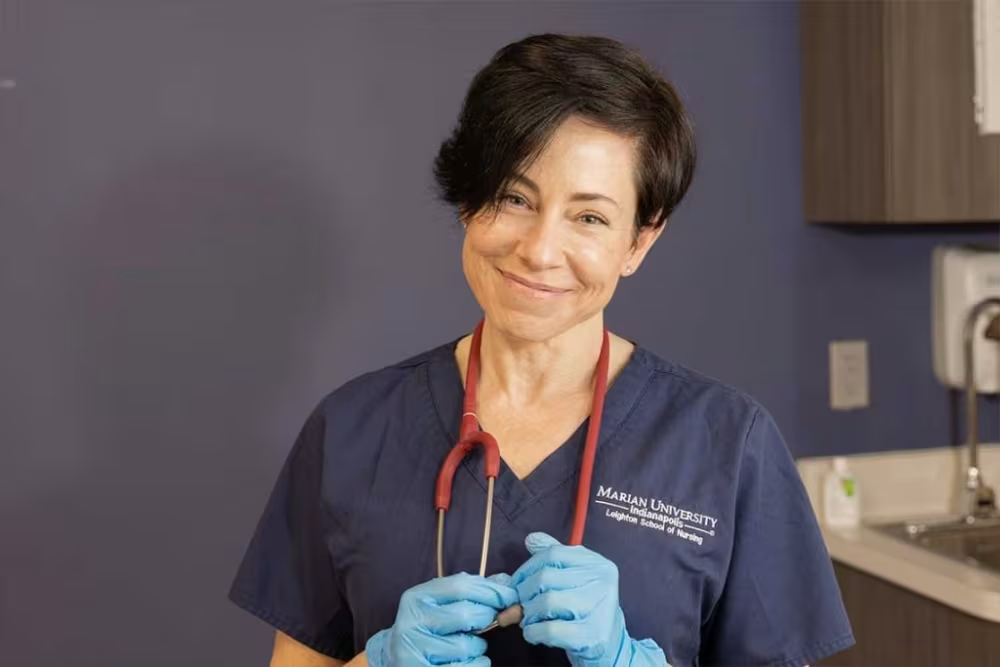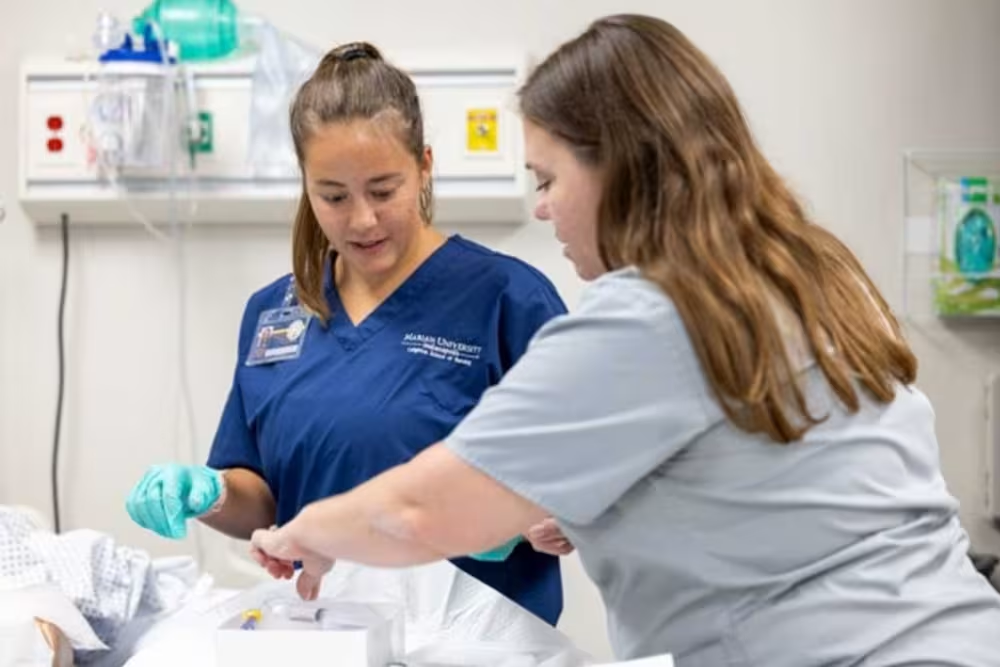Missionary Nurse Career Guide
Each blog post is dated and contains accurate information as of that date. Certain information may have changed since the blog post publication date. If you would like to confirm the current accuracy of blog information, please visit our ABSN overview page or contact admissions at 866.892.6463.
What is a missionary nurse? A missionary nurse is a registered nurse who provides direct care to patients in underserved areas, including underdeveloped areas of the world. Missionary nursing is challenging, as you might sometimes have to work without critical infrastructure, but it allows you to serve others in Christ.

If you feel called to live your Christian faith through a nursing career, you might consider missionary nursing. It’s a way to help others by addressing their whole health: body, mind, and soul. As a missionary nurse you would work with medically underserved, vulnerable populations, either around the world or right here in the U.S.
As a faith-based nursing program, Marian University’s Accelerated Bachelor of Science in Nursing (ABSN) program is grounded in the idea of incorporating your faith into your profession. While Marian is a Catholic institution, not all ABSN students are, nor have to be, Catholic. The ABSN program strives to provide an education that helps you make an impact on society, regardless your religious affiliation.

How could a faith-based nursing program make a difference?
Before making any career decisions, you’ll want to take a closer look at frequently asked questions like “What is a missionary nurse, exactly?” and “What would a missionary RN do?” You should also examine the career pathway and requirements.
What Is a Missionary Nurse?
A missionary nurse is a registered nurse who provides physical nursing care and spiritual support to at-risk individuals in medically underserved populations. Working for religious or humanitarian organizations, missionary RNs often provide care in underdeveloped areas that may have limited access to essential resources, such as healthcare, clean drinking water, sanitary supplies, vaccines, and medicines. Missionary RNs may sometimes work in dangerous parts of the world or in areas that lack critical infrastructure and medical technology.
What Do Missionary Nurses Do?
The work of a missionary nurse is twofold:
- To provide medical attention for physical needs
- To provide spiritual counseling for emotional needs

Missionary nurses will typically perform the same tasks as other registered nurses. These can include:
- Administering medications and vaccinations
- Conducting health screenings and tests
- Dressing wounds
- Performing patient assessments
- Providing spiritual counseling
- Teaching patients about hygiene, disease prevention, nutrition and chronic illness management
- Triaging patients
These nurses also possess knowledge in theology and spirituality and have many opportunities to share their faith. When missionary RNs are not directly working in medically underserved areas, they often raise awareness about local health concerns and fundraise for medical supplies, equipment, and facilities.
Learn how to become an RN even if you have a bachelor’s degree in a different field.

Education Requirements for Missionary Nursing
There are three main ways to first become a registered nurse. You can earn a nursing diploma, an associate degree, or a Bachelor of Science in Nursing (BSN). Out of these three, there are multiple reasons why getting a BSN is your best option.
- The industry is changing, putting more responsibility on the nurse than ever before. As the aging population grows, more demand is placed on nurses to care for these patients, and with demand comes expectations. A baccalaureate education incorporates more in the curriculum preparing registered nurses for their careers.
- Nurses with BSN degrees typically have more career options. There may come a time when you decide you want to move on from missionary nursing. Perhaps you’d like to try a different specialty in another area. If this happens, having a bachelor’s degree will give you more options. According to the American Association of Colleges of Nursing (AACN), nearly 72% of employers have a “strong preference” for hiring nurses with a BSN, and nearly 28% of healthcare employers require a BSN as the minimum qualification for nurses.
- If you already have a non-nursing bachelor’s degree, you could earn your BSN in just 16 months through Marian University’s ABSN program. When compared to a two-year associate degree program, it makes more sense for your career to graduate in less time with a bachelor’s degree.
After you graduate with a BSN and before applying for a missionary nursing position, you must first pass the NCLEX-RN examination. This licensure is a must to become a registered nurse.

How to Become a Missionary Nurse
Nurses in this specialty are required to obtain an unrestricted travel visa and licensure in the country of practice. Depending on the employer, some nursing experience may be required, so you may need to work for a couple of years after becoming a nurse before you can start.
If you are looking for ways to improve your missionary nursing applications, pay attention to the following:
- Missionary nurses are encouraged to be familiar with other cultures, so look for opportunities to take relevant courses or continuing education workshops that can improve your global awareness and cultural competency.
- Proficiency in two or more languages is also strongly recommended.
- Missionary nurses should also have a strong background in theology and/or spirituality and should be open with their faith.
1. Apply to Nursing School
The first step in how to become a missionary nurse is to apply to nursing school. You may be eligible for Marian’s ABSN program if you have a completed non-nursing bachelor’s degree with a cumulative GPA of at least 2.8. If you’re already a student in Marian’s Associate of Science in Health Sciences degree program, then you may qualify to become a transfer student into the ABSN program once you complete your associate degree. In addition, you may need to complete some prerequisites with a grade of C or higher.
An admission advisor at Marian University can review your qualifications and help you put together a plan for applying.

Discover what you need to know about nursing school prerequisites.
2. Graduate With a BSN
Once you’re enrolled in Marian’s ABSN program, you’ll work through a rigorous curriculum consisting of three main components:
- Online coursework that teaches nursing concepts
- Nursing skills and simulation labs that provide hands-on learning experiences
- Clinical rotations, during which you’ll gain clinical experience working with patients under supervision
Along the way, you’ll benefit from working one-on-one with our Academic Success Coaches, who can support your progress and help you navigate any obstacles.
3. Pass the NCLEX-RN and Obtain a License
After graduating with a BSN, you’ll be eligible to take the NCLEX-RN. Plan on spending a considerable amount of time preparing for this intensive exam. You’ll be tested on everything from preventing hospital-acquired infections to managing diabetes.
Rather than reward rote memorization, however, the NCLEX-RN tests your ability to form appropriate nursing responses given a set of patient care circumstances. In other words, you’ll be asked to work through case studies. There may be more than one correct answer, but you’ll need to choose the most correct answer. After passing the exam, you can obtain your RN license.
4. Gain Clinical Experience
Once you’re a licensed RN, you can apply to your first nursing job. Look for a job in the nursing specialty that you’re most interested in, or that could be relevant to missionary nursing. For example, a missionary RN could benefit from experience in the emergency room, as ER nursing allows the RN to work with patients across the lifespan and with a wide range of medical issues. ER nursing can also allow you to develop a calm head under pressure and the ability to quickly triage patients.

5. Know Where to Look for Work
When you’re ready to apply to your first missionary nursing job, you’ve got some options to choose from. Missionary RNs can look for work with:
- Church or other religious groups
- Humanitarian agencies
- Nongovernmental organizations (NGOs)
Some specific organizations that can provide networking opportunities or that directly hire missionary RNs include:
Launch Your Nursing Career at Marian University
Marian University invites you to explore the possibilities that await you with a BSN. With our faith-based ABSN program, you could graduate in as few as 16 months and, after passing the NCLEX-RN, be eligible to apply to any number of different nursing jobs right in your own community or around the world.
Contact an admission advisor today and begin working toward your future.
